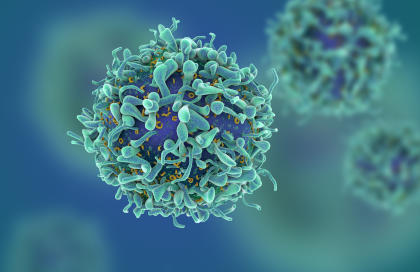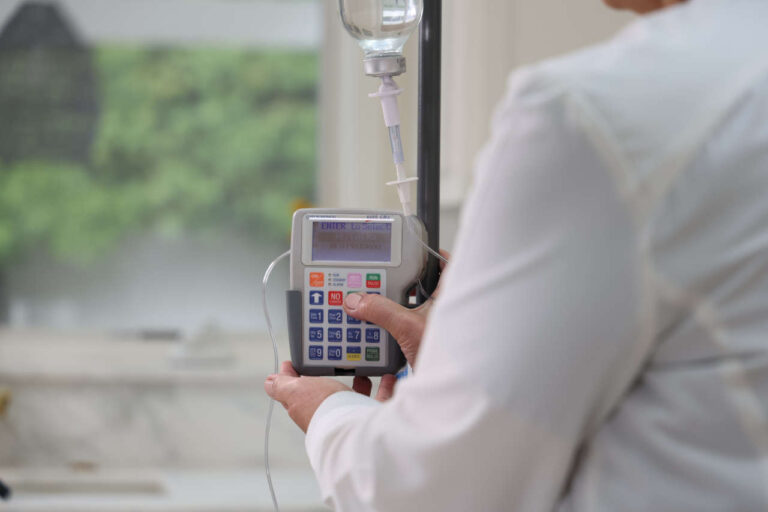
Severe combined immunodeficiency (SCID) is a rare but severe type of primary immunodeficiency disorder that appears in infancy (age 6 months or earlier). Children born with SCID have an incredibly weak immune system. Though they appear healthy at birth, common infections such as chicken pox, pneumonia, and meningitis can be life-threatening due to a severely compromised immune system.
Speak to a Specialist
About Copay AssistanceIn the United States, around 1 in 100,000 infants are born every year with SCID. In the past, many children with SCID died in early childhood due to repeated frequent infections and limited available treatments.
However, thanks to recent advances in science, newborn screening, and early intervention can help successfully treat children with SCID.
Let’s discuss the basics of SCID, including its cause, types, symptoms, risk factors, diagnosis, and available treatment.
What Is Severe Combined Immunodeficiency?
Severe combined immunodeficiency, also known as “bubble boy or boy in the bubble syndrome,” is a group of hereditary (genetic) disorders that affects the immune system of newborns. This condition first came to light after the release of the 1976 television movie about David Vetter (a story focused on a boy who was born with SCID and spent his 12 years living in a plastic bubble to prevent infection).
Children with SCID are highly susceptible to common infections due to a non-functional immune system. As a result, the body of a SCID child is unable to fight off certain bacteria, viruses, and fungi. This can eventually lead to an early death.
What Happens in Severe Combined Immunodeficiency?
Normally, the immune system of a developing baby starts in the bone marrow, where stem cells differentiate into three different types of cells: platelets, blood cells, and white blood cells (WBCs).

WBCs, in particular, are the cells that help your body fight certain pathogens (e.g., bacteria, fungi, viruses) to prevent infection or disease. There are various types of WBCs, including lymphocytes, which are B cells and T cells that carry out the following functions:
- T cells identify, attack, and kill the pathogen.
- B cells function as memory cells (cells that remember or memorize the infection-causing pathogen) and plasma cells (cells that produce antibodies in case the body is exposed to the pathogen again).
In children with SCID, both lymphocytes (T and B cells) are affected or nearly absent. As a result, the immune system becomes extremely weak and does not work properly as it should to fight off infection-causing pathogens.
What Causes Severe Combined Immunodeficiency (SCID)?
SCID occurs due to genetic mutations in multiple genes on X chromosomes. These genes are primarily involved in the development and functioning of immune cells, such as B-cells, T-cells, and natural killer cells (NK cells).
SCID is a recessive X-linked disorder and only affects men since they only have one X chromosome. Women can be carriers that pass the defective genes to male children. However, in more than 80% of cases, children with SCID do not show a family history of SCID.
How Is Severe Combined Immunodeficiency (SCID) Classified?
Healthcare providers have classified SCID into various types based on the type of gene defects. In 15% of cases, gene defects are known. Below are some types of SCID:
Classical X-linked SCID
Classical X-linked SCID occurs as a result of a mutation in a gene (IL2RG gene) located on X chromosome. In this type, white blood cells grow and develop abnormally. As a result, patients with this condition have a low count of T cells, B cells, and natural killer cells that do not function. This type mainly affects males since they only have one copy of the X chromosome.
ADA Deficiency SCID
In this type, a mutation in the ADA gene causes a deficiency of the ADA enzyme that is needed for T cell survival. Doctors call this type ADA deficiency SCID.
Leaky SCID
In this type, a child has notable or even excess T cells that cause inflammation and damage to the body.
Get IVIG Prior Authorization
How You Can Identify if Your Child Has Severe Combined Immunodeficiency (SCID)
The signs and symptoms of SCID tend to appear between 3 to 6 months of age and generally include a frequent respiratory infection, common yeast infections, chronic diarrhea, and fungal pneumonia. Other notable symptoms can include:
- Rashes
- Ear infections
- Slow growth
- Trouble gaining weight
- Infections that do not respond well to antibiotics
- Recurrent thrush (fungal infection) in the mouth
If your child shows the symptoms mentioned above, especially fungal pneumonia, consult your healthcare provider immediately for genetic testing and SCID screening.
What Is the Diagnosis Procedure for Severe Combined Immunodeficiency (SCID)?
Early diagnosis and screening for SCID can increase the positive success rate of combating SCID disorder. A healthcare professional performs a heel prick blood test to check the level of T cells and antibodies in the child’s body.
Depending on the results of blood tests, further tests may be performed to check the genetic markers of SCID via genetic testing.
How Is SCID Treated?
SCID is a severe condition and requires immediate pediatric emergency treatment. Without treatment, SCID children do not survive beyond the first year of life. However, early treatment can improve the prognosis significantly. Below are some of the treatment options currently available for SCID:
Bone Marrow Transplant
Bone marrow transplant is a standard and effective treatment for infants with SCID. In this procedure, blood-forming (also known as hematopoietic) stem cells from the bone marrow of matched donors are transplanted to SCID patients. This reconstitutes the immune system of SCID patients and allows them to develop functional immune systems.
The donor for bone marrow transplants could be a close relative like healthy siblings or parents. However, in most cases, patients do not have matched sibling donors, so transplants from unrelated matched donors are often performed, which has a lower success rate than a matched-related donor.
Moreover, early bone marrow transplantation typically gives the best outcomes for SCID infants. For instance, researchers examined data from 240 infants with SCID and discovered that irrespective of the kind of stem cell donor, the infants who had transplants prior to the age of 3.5 months had the highest chance of survival.
Enzyme Replacement Therapy
Enzyme replacement therapy (ERT) like PEG-ADA is a treatment option for infants with ADA deficiency SCID. In this therapy, a drug is injected regularly to treat the ADA deficiency. This therapy helps prevent frequent infections, restore immune function, and indirectly support child growth by promoting better overall health.
However, ERT is only a temporary treatment option, and it is used until the patient finds a stem cell transplant donor.
Gene Therapy
Gene therapy can be an effective treatment for some X-linked SCID. It is also an option for SCID infants who either are not eligible for stem cell transplants or are unable to find the right donor.
In this procedure, the healthcare provider obtains the stem cells of the SCID child and replaces the defective gene with a normal one in the laboratory. After that, stem cells with the new healthy gene are inserted back into the SCID child’s bone marrow.
Gene therapy is experimental and still in the clinical trials phase in the U.S.
Intravenous Immunoglobulin (IVIG)
IVIG therapy is another effective treatment option for SCID infants to control the chances of recurrent infections. IVIG provides a wide array of antibodies to SCID patients that boost the immune system and help their bodies fight off infections.
Consult an IVIG Specialist
Takeaway
SCID is a rare but severe genetic disorder that can lead to death, even with common infections, if not diagnosed and treated in the first year of life. Gene therapy, IVIG, enzyme replacement therapy, and bone marrow transplants are available treatments to help your child live a healthy life. Consult your healthcare provider if you want genetic testing or have concerns about your child’s health.
REFERENCES:
- PATEL, A. C., & REN, C. L. (2004). Pulmonary Complications of Immunologic Disorders. Pediatric Pulmonology, 140-150. https://doi.org/10.1016/B978-0-323-01909-5.50016-5
- Donda, K., Torres, B. A., Walter, J., & Maheshwari, A. (2023). Immunodeficiency Syndromes Seen During the Neonatal Period. Principles of Neonatology, 498-506. https://doi.org/10.1016/B978-0-323-69415-5.00057-6
- Vaillant, A. a. J., & Mohseni, M. (2023). Severe combined immunodeficiency. StatPearls – NCBI Bookshelf. https://www.ncbi.nlm.nih.gov/books/NBK539762/
- Severe combined Immunodeficiency (SCID). (2019). NIA]ID: National Institute of Allergy and Infectious Diseases. https://www.niaid.nih.gov/diseases-conditions/severe-combined-immunodeficiency-scid#:~:text=Severe%20combined%20immunodeficiency%20(SCID)%20is,highly%20susceptible%20to%20severe%20infections
- Nhgri. (2019). About severe combined immunodeficiency. Genome.gov. https://www.genome.gov/Genetic-Disorders/Severe-Combined-Immunodeficiency
- Agarwal, S., & Cunningham-Rundles, C. (2019). Gastrointestinal Manifestations and Complications of Primary Immunodeficiency Disorders. Immunology and Allergy Clinics of North America, 39(1), 81-94. https://doi.org/10.1016/j.iac.2018.08.006
- Winkelstein, J. A. (2006). Primary Immunodeficiency Diseases. Comprehensive Pediatric Hospital Medicine, 864-869. https://doi.org/10.1016/B978-032303004-5.50140-X
- Cirillo, E., Giardino, G., Gallo, V., Grasso, F., Romano, R., Lillo, C. D., Galasso, G., & Pignata, C. (2015). Severe combined immunodeficiency—An update. Annals of the New York Academy of Sciences, 1356(1), 90-106. https://doi.org/10.1111/nyas.12849













